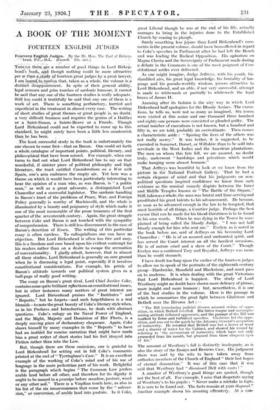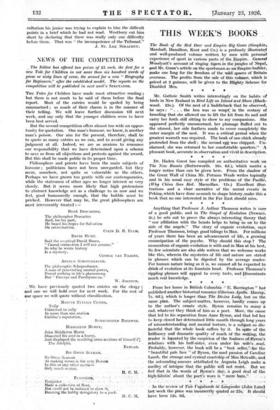A BOOK OF THE MOMENT
FOURTELN ENGLISH Jcpc,4ES
Fourteen Englieh Judges. By the Rt. Hon. The Earl of Birken- head; RC.,--4).L. (Cassell. 25s. net.) Tnoi.Ton there..4ve a number of good things in. Lord Birken- head's hook, Load though nothing could be more attractive per se than t:st-pdy of fourteen great judges by a great lawyer, I am bonp.4*ccinfeas that, taken as a whole, the volume is,.a distinct disappointment. In spite of their general ability, legal acumen and grim touches of sardonic humour, it cannot be said that any one of the fourteen studies is really adequate. Still less could it truthfully be said that any one of them is a work of art. There is something perfunctory, hurried and superfipial in the treatment in almost every case. The writing of short -studies of great themes or great people is, no doubt, a very difficult business and requires the genius of a Halifax or a Saint-Simon, a Sainte-Beuve or a Fronde. Though Lord Birkenhead could not be expected to come up, to this standard., he might surely have • been a little less amateurish than he has been. .
..The least, successful study in the book is unfortunately the one chosen to come first—that on Bacon. One could set forth a whole, catalogue of important points, political, literary, and philosophical that have been missed. For example, when one turns to find out what; Lord Birkenhead has to say on that wonderful,. if sinister piece of political philosophy and high liteniturei the :tract entitled Considerations on a. War with Spain, ane'l arm embraces the empty air. Yet here was a theme on which. it would have been particularly interesting to hear the opinion of a man who, as was Bacon, is " a politic Man." as well as a .great advocate, .a distinguished Lord Chancellor and a successful legislator. The •sardonic handling in Bacon's tract of the problems of Peace,. War, and. Foreign Policy. generally is worthy. of Machiavelli, and the whole is illuminated by a beauty and, poignancy of style which make it one .of the most memorable of the prose treasures of the first quarter of the seventeenth century.. Again, the great struggle between Coke and Bacon is not touched with the sympathy of comprehension. There is still less discernment in the case of Bacon's -desertion of Essex. The writing of this particular essay -is often careless. To colloquialisms one can have no objection. But Lord Birkenhead is often too free and easy. His is a freedom and ease based upon his evident contempt for his readers rather than on a desire to escape the accusation of conventionality. I gladly admit, however, that in almost all these studies, Lord Birkenhead is generally on sure ground when he is discussing a legal _point, especially if it involves constitutional considerations. For example, his precis of Bacon's attitude towards our political system gives us a
half-page of really good writing. . .
The essay on Bacon's great rival, Lord Chief Justice Coke, contains some quite brilliant reflections on constitutional issues, but in other instances many matters of great interest are ignored. Lord Birkenhead praises the " Institutes " and " Reports," but he forgets—and such forgetfulness is a real blemish—to note the great beauty of Coke's literary style when, as in his Prefaces .and Introductions, he deals with abstract questions. Coke's eulogy on the Naval Power of England, and the Might, Majesty and Dominion of Her Fleets, is a deeply moving piece of declamatory eloquence. Again, Coke shows himself by many examples in the " Reports " to have had an instinct for concise narration that might have made him a great writer of short stories had his feet 'strayed into Fiction rather than into the Law.
But, though there are these omissions, one is grateful to Lord Birkenhead for setting out in full Coke's comments printed at the end of " Tyrringham's Case." It is an excellent example of the working of Coke's mind and of his use of language in the more pedestrian part of his work. Delightful is the paragraph which begins " The Common • Law prefers arable land before all other, and therefore for 4ts dignity it ought to be named in a praeeipe before meadow, pasture, wood or any other soil." There is a Virgilian touch-here, as also in his list of the six inconveniences: that come by the " subver- sion," or conversion, of amble land into pasture. In it Coke,
great Liberal though he was at the end of his life, actually manages to bring in the injuries done to the Established Church by ceasing to plough.
Surely something less jejune than -Lord. -Birkenhead's com- ments in the present volimie, should have been offered•in regard to Coke's speeches in Parliament after he had left the Bench and was leading .the Radical Opposition. His aphorism on Magna Charts and the Sovereignty of Parliament made during a debate in the Commons is one of the most poignant of Con- stitutional asides ever delivered. • -
As one might imagine, Judge Jeffreys, with his youth, hig dandified airs, his great legal knowledge, his brutality of lan- guage and his pseudo-worldly wisdom, proves attractive to Lord Birkenhead, and an able, if not very successful, attempt is made to whitewash or partially to whitewash the legal bravo of James II.
Amusing after its fashion is the airy way in which Lord Birkenhead half apologizes for the Bloody Assizes. The execu- tions," he tells us, were not so many as imagined: Six towns were 'visited- at this assize -and. one- thousand three hundred and eighty7one persons were convicted or pleaded-guilty. The actual number of executions is not known, but a hundred and fifty is, we are told; probably an overestimate: Then comes a characteristic aside : " Sparing the lives of the others was not really -mercy." It was better, 'it is suggested, to be
executed in Somerset, Dorset, or Wiltshire than to be sold into servitude in the West Indiei and tlie American plantations. The 'men-'on whom this fate fell, we' are assured, no doubt truly, underwent " hardships and privations which would make hanging seem- almost humane:" - That Jeffreys was beautiful to look at we "know from the
pictiire in the National Poitrait Gallery. That he had a certain elegance of mind r and that his judgments on nom;
political questions inspired' confidence we knoW froth such ,
evidence as the musical comedy displite between the Inner
and Middle Temples known 'as "The Battle of the Organs." Stilt, takenas a Whole; the man was brutal and tithe-serving and prostituted his'great talents to hisadvaneement. lie became,
as soon as he advanted enough in the /aW to be tempted, that rriost horrible of all things,4 Courtier judge. Perhaps the best excuse that can be made for his blood-thirstiness is to be found
in his own words. When he was dying in the ToWci he corn= plained of being called the bloody Judge. " I was not half bloody enough for him who sent me." Evelyn, as is noted in the book before me, said of Jeffreys on his becoming Lord Chancellor : " lie is of an assured and undaunted spirit, and has served the-Court interest on all the hardiest occasions. He is of nature cruel and a slave of the Court." Though Evelyn was a confirmed Tory and Royalist, *Jeffreys was more than he could stomach.
I have dwelt too king upon the earlier of the fourteen judges to allow me to speak of the portraits of the eighteenth century group—Hardwicke, Mansfield and Blackstone, and must pass on to moderns. It 'is when dealing with the great Victorians that Lord Birkenhead is happiest. The study of Lord Westbury might no doubt have shown more delicacy of phrase, more insight. and more humour ; but, nevertheless, it is one of the best studies in the volume.. Here is the. passage in which he summarizes the great fight between Gladstone and Bethel! over the Divorce Act :-
" The Bill introducing judicial divorce aroused MA-inns of oppo- sition, in which Bethell revelled. His bitter tongue and uncompro- mising attitude inflamed opponents, and the passage of the Bill was marked by fierce and Wrbtilent speeches. Gladstone led the oppo- sition, and was cut to the quick by the Attorney-General's accusation of insincerity. He retorted that Bothell was but a hewer of wood and a drawer of water for the Cabinet, and showed his wound by referring to the accusations of insincerity which have not only proceeded from his mouth, but gleamed from those eloquent eyes of his."
The account of Westbury's fall is distinctly inadequate, as is also the story of the Essays and Reviews Case. His judgment there was said by the wits to have taken away from orthodox members of the Church of England " their last hopes of eternal damnation." It was of this case that it was said that Westbury had " dismissed Hell with costs ! "
A number of Westbury's good things- are quoted, though not the best of all. For example, .I miss that desperate saying of Westbury's to his pupils : " Never make a Mistake in logic. It is sure to be found out. The facts remain at your disposal."
Another example shows his amazing effrontery. At a qui- . sultation his junior was trying to explain to- him the difficult points in a brief which he had not read. Westbury cut him short by declaring that there was really only one difficulty before them. That was " the incompetence of the Tribunal."
J. ST. LOE STRACHEY.











































 Previous page
Previous page